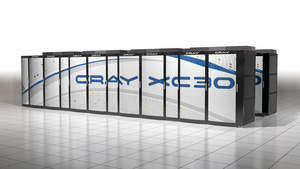

Cray has added Intel coprocessors and graphics accelerators from Nvidia to its XC30 supercomputers, in the latest step in its 7-year-old Adaptive Supercomputing initiative.
The initiative, introduced in 2006, was launched to create a unified supercomputer architecture that can support a range of processing technologies. The introduction of support for Intel’s Xeon Phi coprocessors and Nvidia’s Tesla K20X GPU accelerators fits in with that effort, according to Peg Williams, senior vice president of high performance computing systems at Cray.
“Integrating diverse accelerator and coprocessor technologies into our XC30 systems gives our customers a variety of processing options for their demanding computational needs,” Williams said in a statement. “Equally as important, Cray XC30 supercomputers feature an innovative software environment that allows our customers to optimize their use of diverse processing options for their unique applications.”
Organisations running high-performance computing (HPC) environments for the past several years have used GPU accelerators from Nvidia and Advanced Micro Devices to ramp up the performance of their systems while keeping power consumption in check. Last year, Intel introduced its Xeon Phi coprocessors, x86-based chips that have 60 or more cores to fit in the role that the GPU accelerators have played. Intel officials have argued that the Xeon Phi chips offer programmers a familiar X86 architecture and tools.
Intel in June introduced two new Xeon Phi coprocessors and previewed the upcoming Knights Landing, a 14-nanometre chip that will be able to be used as either a coprocessor or as a primary processor.
AMD and Nvidia officials have countered that any recoding needed to be done to run applications on the GPU accelerators is minimal.
The use of coprocessors and accelerators is becoming increasingly popular. Fifty-four of the supercomputers on the Top500 list of the world’s fastest systems use the technologies, including 39 that use GPU accelerators from Nvidia, 11 using Xeon Phis and three using AMD’s ATI Radeon GPU accelerators.
The massive Tianhe-2 supercomputer in China, which sits atop the Top500 list, uses 32,000 Xeon E5-2600 processors and 48,000 Xeon Phi coprocessors.
Cray introduced the Intel Xeon-powered XC30 last year, followed by the XC30-AC in May. The XC30 supercomputers can run as high as $10 million (£6.2m); by comparison, the XC-30 systems start at $500,000 (£309,157). Extending its reach into the lower end of the HPC space makes sense. IDC analysts said in September that in the first half of the year, revenue for HPC technical systems jumped 7.9 percent to almost $2.6 billion (£1.6bn) and shipments grew 26 percent, fuelled in large part by the continued recovery of the bottom half of the market, where systems sell for $250,000 (£154,578) or less. The top half – those systems selling for $500,000 or more – had seen strong gains even through the global recession and saw record growth in 2012, according to Earl Joseph, program vice president for technical computing for IDC.
“We said earlier that we did not expect the supercomputers segment to maintain that steep growth curve in 2013, although there will be other growth periods in the future,” Joseph said in a statement. “In the first and second quarters of this year, revenue growth has shifted to sub-$250,000 systems as the lower half of the market continues to rebound from the global economic recession.”
How well do you know the cloud? Take our quiz.
Originally published on eWeek.
Nvidia to partner with TSMC, Foxconn, Wistron, Amkor and SPIL to build $500 billion (£377…
American think tank warns about possible threat to US defence, after China imposes rare earth…
China is reportedly pursuing three alleged US NSA operatives, after cyberattacks on Chinese infrastructure
Chip making giant ASML mirrors other equipment makers, and outlines financial impact of Donald Trump's…
AI is transforming cybersecurity, offering faster defence and smarter attacks. Learn how businesses can harness…
Search engine giant being sued for £5 billion ($6.64 billion) damages over allegations for online…